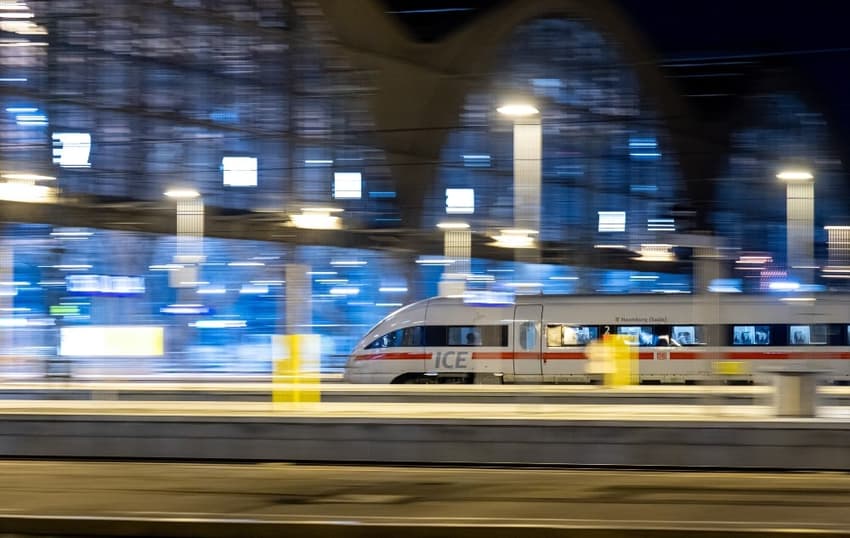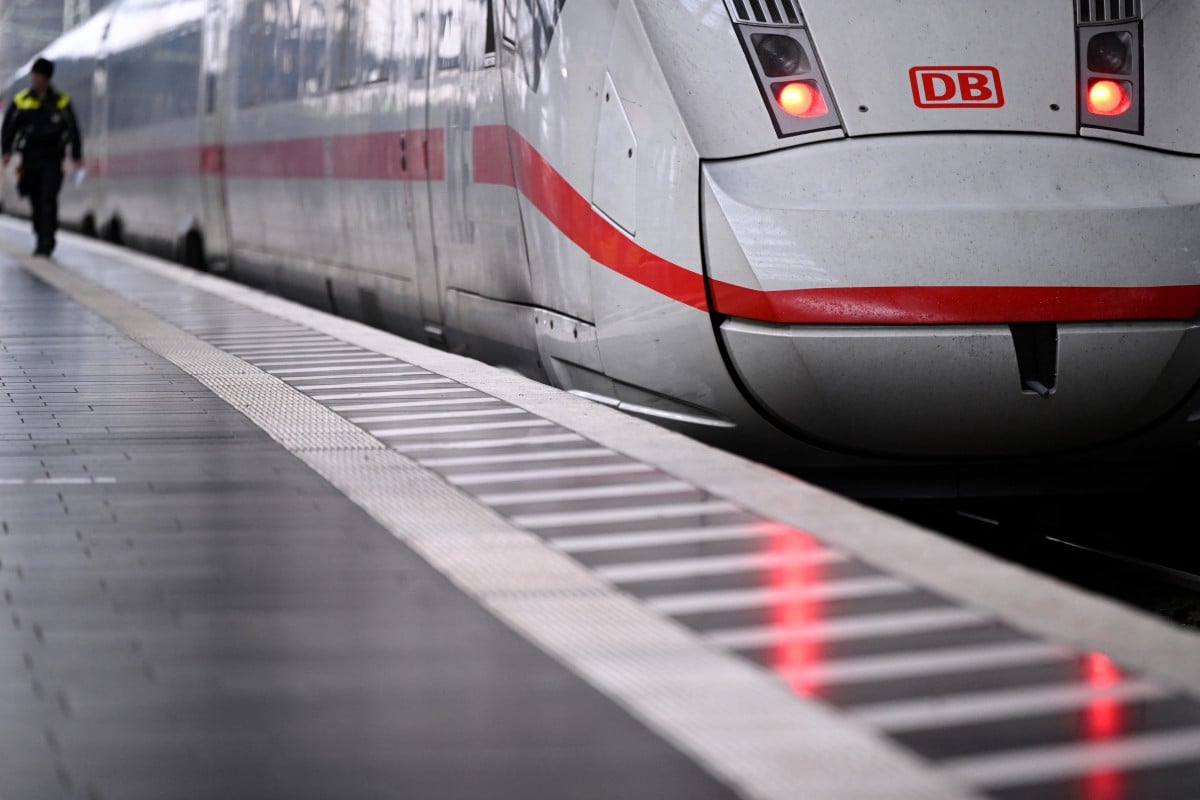'Rail no longer reliable': How latest German train strikes are hitting services

On Monday German train drivers union GDL called more strikes this week - as well as future unlimited ones which would be announced without prior notice. Here's what passengers need to know.
On Thursday and Friday only one in five regional, long-distance and S-Bahn trains are slated to be in service as the GDL union stages another round of strikes.
While the strike is set to stretch until Friday at 1 pm, delays are expected throughout the day.
READ ALSO: German air and rail workers walk out simultaneously in new strike round
What’s going on?
After four months of failed negotiations between German train drivers union GDL and the state-owned Deutsche Bahn, GDL head Claus Weselsky felt like the final straw had been reached.
Following an more than month-long peace truce between the last Deutsche Bahn train strikes and the latest round of negotiations which ended Sunday, Weselsky on Monday called for “a wave” of unlimited actions which would render regional and long-distance transport "unreliable”.
READ ALSO: German train drivers union announces new wave of strikes
The first action on passenger trains started Thursday.
"The first strike will last for 35 hours so everyone in the country can feel what we are talking about," Weselsky said, adding that further strikes would follow.
"We are starting a so-called wave of strikes," he said, which will be announced "when we think the time is right" and no longer 48 hours in advance as has been the case in the past.
As a result, "rail is no longer a reliable means of transport", he added
What is the exact timing of the strikes?
The upcoming strike in passenger transport began on Thursday at 2 am and ended on Friday at 1 pm, said Weselsky.
In rail freight transport, the strike already began Wednesday at 6 pm and last until 5 am on Friday.
After that, however, further work stoppages would come spontaneously, and Weselsky left it open open whether there would also be strikes over the four day Easter weekend starting Friday, March 29th.

Weselsky announcing the strikes at a press conference in Berlin on Monday. Photo: picture alliance/dpa | Hannes P Albert
What is the union demanding?
As well as a salary hike to help train drivers cope with higher living costs, the GDL union is pushing for a reduced working week of 35 hours, down from 38 hours, with no loss in wages.
Deutsche Bahn says it has made concessions amounting to up to 13 percent more pay, as well as the option of cutting the work week by one hour from 2026.
How will “strike waves” affect passengers?
Passengers could be caught cold by this new strategy before starting their journey. This is because the procedure could prevent Deutsche Bahn from being able to draw up emergency timetables before the start of the strike as they have previously done.
According to Weselsky, neither the length nor the start of the nationwide wave strikes will be known and emergency plans will "very probably not be possible".
The strike also has a broader effect on the economy. A multi-day walkout by train drivers in January caused travel disruption for thousands of passengers and heaped pressure on supply chains already strained by tensions in the Middle East.
Deutsche Bahn estimates that each strike day costs the German economy "a low two-digit million figure".
How severe are the restrictions on train transport?
According to Deutsche Bahn, the strike on Thursday and Friday will have a "massive impact" on operations. During the last strike at the end of January, around 20 percent of long-distance services alone were cancelled, and there were also major disruptions to Deutsche Bahn's regional trains and S-Bahn trains.
What is running despite the strike - and where can I find out more?
"During the strike, DB is offering a basic range of long-distance, regional and S-Bahn services," the Group writes on its website. The offer can be accessed via the timetable information on their website and in the DB Navigator or by calling the strike hotline on 0800-99 66 33.
DB is also offering a a telephone travel information service on 030/2970. DB asks travellers to find out 24 hours before departure whether their connection is available.
What alternatives are there to travelling with DB?
Private railways such as FlixTrain are not on strike by the GDL and can still be used by travellers. Bus connections are a possible alternative. Travelling by plane will be difficult this week due to the announced Lufthansa strikes on Thursday and Friday.
READ ALSO: Lufthansa ground staff in Germany to stage another airport strike
Can travellers take another train?
Luckily yes. "All passengers who have purchased a ticket up to and including March 4th for a journey in the period from March 7th to March 8th 2024 and wish to postpone it due to the GDL strike can use their ticket at a later date," wrote Deutsche Bahn in a statement.

An ICE (Inter City Express) of German national railway operator Deutsche Bahn (DB). Photo: Kirill KUDRYAVTSEV/AFP.
This means you can continue your journey to your planned destination on any other train, even if the route is different to the original one. This also applies to journeys from abroad to Germany and vice versa. Seat reservations that are no longer required can be cancelled free of charge at the DB ticket office.
DB also put a goodwill offer on the table: Anyone who has the opportunity to bring their journey forward can travel with immediate effect.
How do the strikes affect employees?
The employee bears the so-called travel risk, meaning they need to make every reasonable effort to get to work on time. This may include travelling by car instead of taking the train. Delays that are foreseeable - as is usually the case with strikes - must be planned for by the employee.
For example, you have to leave earlier or allow more time for a diversion.
If you are still late, this can have consequences under labour law. But there are also limits: For example, it's not considered reasonable to start your journey to work the day before and stay overnight in a hotel. You also don't have to pay for a taxi journey that is completely disproportionate to your salary.
While there is no entitlement to working from home during strikes, German employers are often flexible about 'Home Office', in fields which allow for it, during strikes.
How is Deutsche Bahn reacting to the newest strikes?
Not very well.
Chief Human Resources Officer Martin Seiler criticised the GDL's announcement on Monday that it would no longer provide at least 48 hours' notice of further strikes in future. "These are a sheer imposition for our passengers."
Because the train drivers' union is not getting its maximum demands, it is striking again, said Seiler.
"That's stubborn and selfish. Many millions of people in our country cannot travel by train because the GDL leadership is unwilling to compromise."
He added that millions of euros are being wasted "because a few people are fighting for their own particular interests".
With reporting by AFP.
Comments
See Also
On Thursday and Friday only one in five regional, long-distance and S-Bahn trains are slated to be in service as the GDL union stages another round of strikes.
While the strike is set to stretch until Friday at 1 pm, delays are expected throughout the day.
READ ALSO: German air and rail workers walk out simultaneously in new strike round
What’s going on?
After four months of failed negotiations between German train drivers union GDL and the state-owned Deutsche Bahn, GDL head Claus Weselsky felt like the final straw had been reached.
Following an more than month-long peace truce between the last Deutsche Bahn train strikes and the latest round of negotiations which ended Sunday, Weselsky on Monday called for “a wave” of unlimited actions which would render regional and long-distance transport "unreliable”.
READ ALSO: German train drivers union announces new wave of strikes
The first action on passenger trains started Thursday.
"The first strike will last for 35 hours so everyone in the country can feel what we are talking about," Weselsky said, adding that further strikes would follow.
"We are starting a so-called wave of strikes," he said, which will be announced "when we think the time is right" and no longer 48 hours in advance as has been the case in the past.
As a result, "rail is no longer a reliable means of transport", he added
What is the exact timing of the strikes?
The upcoming strike in passenger transport began on Thursday at 2 am and ended on Friday at 1 pm, said Weselsky.
In rail freight transport, the strike already began Wednesday at 6 pm and last until 5 am on Friday.
After that, however, further work stoppages would come spontaneously, and Weselsky left it open open whether there would also be strikes over the four day Easter weekend starting Friday, March 29th.

What is the union demanding?
As well as a salary hike to help train drivers cope with higher living costs, the GDL union is pushing for a reduced working week of 35 hours, down from 38 hours, with no loss in wages.
Deutsche Bahn says it has made concessions amounting to up to 13 percent more pay, as well as the option of cutting the work week by one hour from 2026.
How will “strike waves” affect passengers?
Passengers could be caught cold by this new strategy before starting their journey. This is because the procedure could prevent Deutsche Bahn from being able to draw up emergency timetables before the start of the strike as they have previously done.
According to Weselsky, neither the length nor the start of the nationwide wave strikes will be known and emergency plans will "very probably not be possible".
The strike also has a broader effect on the economy. A multi-day walkout by train drivers in January caused travel disruption for thousands of passengers and heaped pressure on supply chains already strained by tensions in the Middle East.
Deutsche Bahn estimates that each strike day costs the German economy "a low two-digit million figure".
How severe are the restrictions on train transport?
According to Deutsche Bahn, the strike on Thursday and Friday will have a "massive impact" on operations. During the last strike at the end of January, around 20 percent of long-distance services alone were cancelled, and there were also major disruptions to Deutsche Bahn's regional trains and S-Bahn trains.
What is running despite the strike - and where can I find out more?
"During the strike, DB is offering a basic range of long-distance, regional and S-Bahn services," the Group writes on its website. The offer can be accessed via the timetable information on their website and in the DB Navigator or by calling the strike hotline on 0800-99 66 33.
DB is also offering a a telephone travel information service on 030/2970. DB asks travellers to find out 24 hours before departure whether their connection is available.
What alternatives are there to travelling with DB?
Private railways such as FlixTrain are not on strike by the GDL and can still be used by travellers. Bus connections are a possible alternative. Travelling by plane will be difficult this week due to the announced Lufthansa strikes on Thursday and Friday.
READ ALSO: Lufthansa ground staff in Germany to stage another airport strike
Can travellers take another train?
Luckily yes. "All passengers who have purchased a ticket up to and including March 4th for a journey in the period from March 7th to March 8th 2024 and wish to postpone it due to the GDL strike can use their ticket at a later date," wrote Deutsche Bahn in a statement.

This means you can continue your journey to your planned destination on any other train, even if the route is different to the original one. This also applies to journeys from abroad to Germany and vice versa. Seat reservations that are no longer required can be cancelled free of charge at the DB ticket office.
DB also put a goodwill offer on the table: Anyone who has the opportunity to bring their journey forward can travel with immediate effect.
How do the strikes affect employees?
The employee bears the so-called travel risk, meaning they need to make every reasonable effort to get to work on time. This may include travelling by car instead of taking the train. Delays that are foreseeable - as is usually the case with strikes - must be planned for by the employee.
For example, you have to leave earlier or allow more time for a diversion.
If you are still late, this can have consequences under labour law. But there are also limits: For example, it's not considered reasonable to start your journey to work the day before and stay overnight in a hotel. You also don't have to pay for a taxi journey that is completely disproportionate to your salary.
While there is no entitlement to working from home during strikes, German employers are often flexible about 'Home Office', in fields which allow for it, during strikes.
How is Deutsche Bahn reacting to the newest strikes?
Not very well.
Chief Human Resources Officer Martin Seiler criticised the GDL's announcement on Monday that it would no longer provide at least 48 hours' notice of further strikes in future. "These are a sheer imposition for our passengers."
Because the train drivers' union is not getting its maximum demands, it is striking again, said Seiler.
"That's stubborn and selfish. Many millions of people in our country cannot travel by train because the GDL leadership is unwilling to compromise."
He added that millions of euros are being wasted "because a few people are fighting for their own particular interests".
With reporting by AFP.
Join the conversation in our comments section below. Share your own views and experience and if you have a question or suggestion for our journalists then email us at [email protected].
Please keep comments civil, constructive and on topic – and make sure to read our terms of use before getting involved.
Please log in here to leave a comment.